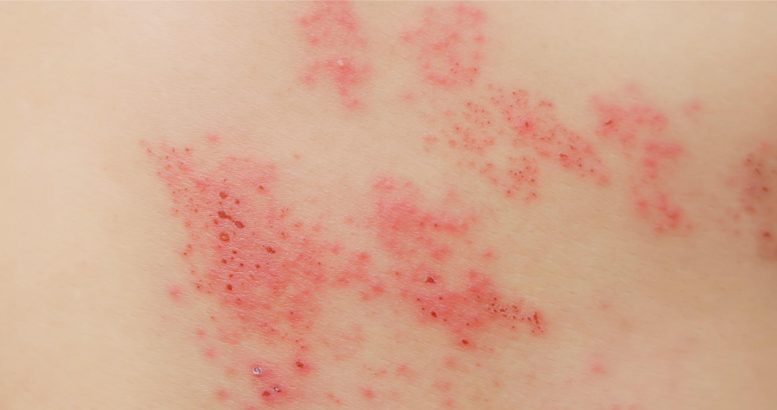
Researchers discover a potential explanation for why those who have had shingles are more likely to suffer a stroke.
According to recent research from the University of Colorado Anschutz Medical Campus, scientists looking into why people who have had shingles are at a higher risk of stroke now believe the answer lies within lipid vesicles called exosomes that transport proteins and genetic information between cells.
The study explores the mechanisms behind the connection between shingles and strokes and was recently published in The Journal of Infectious Diseases.
“Most people know about the painful rash associated with shingles, but they may not know that the risk of stroke is elevated for a year after infection,” said the study’s lead author Andrew Bubak, Ph.D., assistant research professor in the Department of Neurology at the University of Colorado School of Medicine. “Importantly, the rash is often completely healed and individuals feel normal but nonetheless are walking around with this significant elevation in stroke risk.”
The Role of the Varicella-Zoster Virus
The varicella-zoster virus, which also causes chicken pox, is what causes herpes zoster (HZ), often known as shingles. The virus lingers in the ganglionic neurons and has the potential to reactivate and cause excruciating pain. However, researchers have discovered that shingles can also raise the risk of stroke, particularly in individuals under the age of 40, for whom the shingles vaccination is not normally recommended.
People who have rashes on their faces are more at risk, possibly because of how close the rash is to the brain.
Bubak and his colleagues began researching exosomes more closely to better understand how this works.
Exosomes: Key Players in Stroke Risk
“Exosomes carry pathogenic cargo that can cause thrombosis and inflammation distant from the site of actual infection,” Bubak said. “That could ultimately lead to a stroke in patients.”
Researchers collected plasma samples from 13 patients with shingles and 10 without. The samples were taken at the time of infection and at 3-month follow-ups for a subset of patients and exosomes were extracted from the plasma.
The researchers found prothrombotic exosomes which could cause blood clots in those with the infection. They also discovered proinflammatory exosomes that also pose risks for stroke at the 3-month follow-up.
Bubak said the findings suggest that in a subset of people with shingles, the virus may not return to latency, or the circulating exosomes that induce a prolonged prothrombotic state may persist even after therapy is done and the rash is gone. He said using antiviral agents longer with the addition of antiplatelet and anti-inflammatory agents could help.
“As well as initiatives to increase HZ vaccine uptake to decrease stroke risk, particularly in individuals with known preexisting stroke risk factors,” said Bubak. “If these findings are confirmed with a larger longitudinal study, then this could change clinical practice.”
Most physicians are unaware of the connection between shingles – which has an effective vaccine – and stroke.
“But it’s really important and so easily mitigated,” Bubak said. “Send them home with antiplatelet agents.”
Reference: “Zoster-Associated Prothrombotic Plasma Exosomes and Increased Stroke Risk” by Andrew N. Bubak, Christina Coughlan, Janelle Posey, Anthony J. Saviola, Christy S. Niemeyer, Serena W. R. Lewis, Sara Bustos Lopez, Adriana Solano, Stephen K. Tyring, Cassidy Delaney, Keith B. Neeves, Ravi Mahalingam, Kirk C. Hansen and Maria A. Nagel, 6 October 2022, The Journal of Infectious Diseases.
DOI: 10.1093/infdis/jiac405
Never miss a breakthrough: Join the SciTechDaily newsletter.